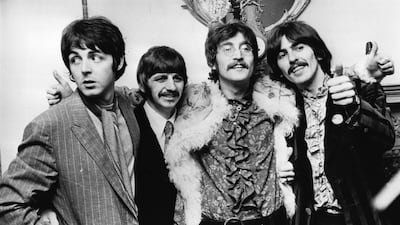Why were The Beatles significant?
How did their music spearhead the 1960s pop-culture movement dubbed the British Invasion in the US?
And who is Jude and where is Penny Lane?
While these queries sound like the perfect starting off points for spirited conversations by Beatlemaniacs, they were actually elements of serious inquiry at Liverpool Hope University.
In 2009, the UK institution made global headlines by offering what was believed to be the first Master's degree on The Beatles.
The academic programme, titled The Beatles, Popular Music and Society, was offered on a full-time and part-time basis by the university's Department of Music and included four 12-week modules and a final dissertation.
A decade ago today, on January 25, 2011, Canadian student and singer Mary Lu Zahalan-Kennedy took the long and winding road to the lectern to receive her diploma as the first graduate of the course.
In an interview with the BBC, she admitted the experience wasn't all strawberry fields.
"The course was challenging, enjoyable and it provided a great insight into the impact The Beatles had and still have to this day across all aspects of life,” she said.
The course is no longer offered at the university, but their move helped shed a light on a growing number of academic courses dedicated to various aspects of the Fab Four, from their lyricism to their fashion choices.
While the idea of analysing the literary quality of Yellow Submarine may prove a bit much for the casual student, the growth in this niche subject field indicates there are still many diehard fans with tickets to ride.
Music and industry appreciation
One of the oldest known courses dates back more than 25 years ago, to the University of Southern California, where they launched The Beatles: Their Music and Their Times by senior lecturer Bill Bierach.
The five-month undergraduate course, which is still offered today by Bierach, begins every August with weekly lectures exploring "pertinent background information on the four Beatles, their personal and professional dealings, their approach to live performance and studio recording, and the activities of their managerial and production staff".
It culminates with three exams.
Such was the popularity of the course, Bierach went on to offer other Beatles lectures, including Strawberry Fields Forever: The Beatles' Impossible Song.
While aware such dedication to the band could leave some scratching their heads, Bierach explained The Beatles' significance can only be appreciated within a larger context.
"In the music world, there's before The Beatles and after The Beatles," he said in an interview on the university website.
"The technology that's available today never would've happened if The Beatles hadn't come along. They were such intriguingly original musicians."
Perhaps buoyed by its enduring success, the nearby University of California, Los Angeles (UCLA) launched a Beatles course of its own.
Offered by the university’s Herb Alpert School of Music, the programme – open to undergraduate and graduate students – comes with well-connected guest lecturers from the music industry who provide first-hand accounts of working with The Beatles.
According to UCLA adjunct professor David Leaf, who launched the course, the programme is not meant to be an exercise in fan appreciation. Instead, the focus is on how The Beatles managed to maintain their lucrative standing 50 years on.
"We'll watch how their story unfolds in real time, how they created a body of timeless and enormously influential music, and how the group has both been the subject of dozens of films and become an iconic trademark that still generates over $100 million in worldwide revenue every year – even though the group last performed on a concert stage more than a half-century ago," Leaf statedon the university's website.
Other universities, mainly in the US, also developed courses about the Fab Four for beginners and those wanting to delve deeper than the catchy melodies.
New York's Skidmore College has been offering various Beatles courses and seminars for over 20 years, including an introductory course on their career.
While Illinois Wesleyan University, in the US Midwestern state of Illinois, previously offered The Beatles and Their World, a course looking at how the group influenced attitudes towards fashion and global conflicts.
The University of Pittsburgh also ran The Music of The Beatles course, which focused on their career "within the social and cultural context of the 1960s".
The course came complete with a required audio list of select albums, DVDS and YouTube links of performances, all of which will then be assessed through six “listening assignments”.
No shortcut to success
With so many people spending hours listening, discussing and dissecting The Beatles fact and folklore, how do band members feel about all of the classroom attention?
"Ridiculous and yet very flattering," offered Paul McCartney in a 2014 interview published on his website.
The singer and bassist said such courses are “cool”, if the goal remains academic. If the aim from the classes, however, is to be a successful musician, well, then, you have to let it be.
“I don’t think that by studying popular music you can become a great popular musician; it may be that you use it to teach other people about the history, that’s all valuable,” he said.
“But to think that you can go to a college and come out like Bob Dylan? Someone like Bob Dylan, you can’t make it.”


